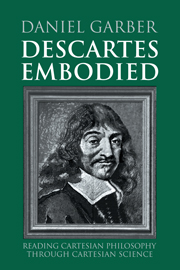Book contents
- Frontmatter
- Contents
- Acknowledgments
- Abbreviations, Citations, and Translations
- Introduction
- Part I Historiographical Preliminaries
- Part II Method, Order, and Certainty
- Part III Mind, Body, and the Laws of Nature
- 7 Mind, Body, and the Laws of Nature in Descartes and Leibniz
- 8 Understanding Interaction: What Descartes Should Have Told Elisabeth
- 9 How God Causes Motion: Descartes, Divine Sustenance, and Occasionalism
- 10 Descartes and Occasionalism
- 11 Semel in vita: The Scientific Background to Descartes' Meditations
- 12 Forms and Qualities in the Sixth Replies
- Part IV Larger Visions
- Sources
- Index
11 - Semel in vita: The Scientific Background to Descartes' Meditations
Published online by Cambridge University Press: 10 November 2009
- Frontmatter
- Contents
- Acknowledgments
- Abbreviations, Citations, and Translations
- Introduction
- Part I Historiographical Preliminaries
- Part II Method, Order, and Certainty
- Part III Mind, Body, and the Laws of Nature
- 7 Mind, Body, and the Laws of Nature in Descartes and Leibniz
- 8 Understanding Interaction: What Descartes Should Have Told Elisabeth
- 9 How God Causes Motion: Descartes, Divine Sustenance, and Occasionalism
- 10 Descartes and Occasionalism
- 11 Semel in vita: The Scientific Background to Descartes' Meditations
- 12 Forms and Qualities in the Sixth Replies
- Part IV Larger Visions
- Sources
- Index
Summary
Descartes opens Meditation I with his persona, the meditator, reflecting on the project to be undertaken. Descartes writes:
I have observed for some years new how many false things I have admitted as true from my earliest age, and thus how dubious are all of those things that I built on them; and so, I observed that once in life [semel in vita] everything ought to be completely overturned, and ought to be completely rebuilt from the first foundations, if I want to build anything firm and lasting in the sciences.
(AT VII 17)And with this, the project has begun. Descartes' meditator quickly begins by rejecting the commonsense epistemological principles on which everything he formerly believed rested, and quickly sets about putting the world back together again. Of course, one of the central projects undertaken in this connection must be the replacement of the epistemological principles rejected with new, more trustworthy principles. Just as Descartes' meditator undermined his former beliefs by undermining the epistemology on which they were based, he will rebuild his world by rebuilding its epistemology. New epistemological principles thus seem to be the very “first foundations” on which he will build something “firm and lasting in the sciences.” But an obvious question to raise about this, the opening sentence of the Meditations, and about the project that follows out of it, is why? Why does Descartes believe it necessary even once in life to rebuild all of our beliefs in the way he suggests? Why does Descartes feel called to such an epistemological project?
- Type
- Chapter
- Information
- Descartes EmbodiedReading Cartesian Philosophy through Cartesian Science, pp. 221 - 256Publisher: Cambridge University PressPrint publication year: 2000



